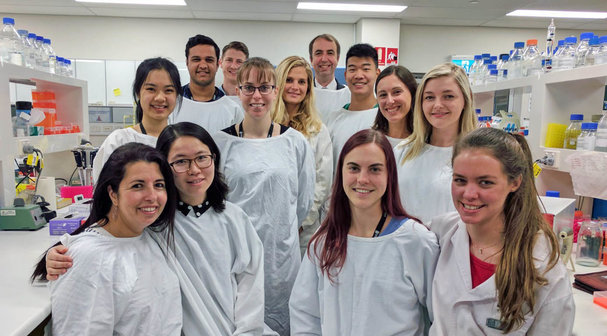
The Crossley Lab at University of New South Wales in Sydney, Australia.
The invisible leg-up for males in science
A professor reflects on his privilege.
12 January 2018
COMMENT

The Crossley Lab at University of New South Wales in Sydney, Australia.
The under-representation of women at senior levels in science is a sensitive issue, and I don’t claim to have all the answers. About 60 research students and postdocs have passed through the Crossley Lab, where we study how transcription factors control cell fate and how the breakdown of this process leads to disease. About 40 are female and 20 male. Yet in my department, the School of Biotechnology and Biomolecular Sciences, there is only one female professor.

Merlin Crossley
Our ultimate aim is to have the most talented people delivering the most ambitious and reliable science. If we are to support these people to deliver, we need to be aware of the many invisible forces that facilitate or stymie their success. It may be of some help to comment on my own experience as a man in science.
Role models: I was brought up to respect achievement and duty. There was no shortage of male role models. We learned about Julius Caesar, King Arthur, Robin Hood, Captain Cook, Lawrence of Arabia and Simpson and his donkey. We read books like Lord of the Rings, and studied Rudyard Kipling, H G Wells, Arthur Conan Doyle, and George Orwell. We also did quite a lot on religion and its history. As I got interested in science I found my way to the works of Charles Darwin and Richard Feynman. I liked Stephen Jay Gould’s work and Richard Dawkins’ books, The Selfish Gene and The Extended Phenotype. It was pretty clear what success looked like.
Competition: School and university were games. Every engagement was a sport. I can remember one student asking the teacher — isn’t our school too competitive? To be told, gently but wisely perhaps — life is competitive! The games weren’t all-absorbing. They were intense on the field and then off the field the friendships were deep. But scoreboards were everywhere. We wallowed in scores, statistics and numbers. We knew where we stood. I’ve only recently realized that some people are sensitive to the dark, oppressive side of numbers and metrics in a way I never have been.
Mobility: I can remember one mentor telling me how important it was to transfer to new institutions. I didn’t really want to move — I’m a ‘the grass is greener on this side of the fence’ person. But I did — after my first degree, after my second and after my postdoc. I chose my moves carefully.
Mentors: There is an odd trick about appointments. Committees tend to appoint people like themselves and then they endeavour to support the appointee, partly to reassure themselves that they made the right decision. I benefited from this magic. I didn’t have to ask for much. I found that the people who appointed me wanted to make me successful. My mentors acted as sponsors who nominated me for awards and suggested opportunities. When I got awards I felt I had to work even harder to justify the accolades. So I worked harder and harder.
Family: When I had a family I was already firmly established as someone who was obsessed with their work. I never felt this was frowned upon. I felt supported as a mad or eccentric scientist might feel. I care about my family but am regarded as hopeless at practical things. I’m not the one to go to if you want something done at home, so I am seldom distracted. At work, I have a reputation as someone that you can go to if you want something done.
Over recent years, I and others have woken up to the fact that efforts to achieve gender equality have fallen short. There has been progress, but it will plateau if new things are not tried. What more can we do? In some cases, quotas set at appropriate levels will have a role.
The asymmetry of career interruptions is a challenge which requires change. More investments in childcare can only help, as is happening at the Walter and Eliza Hall Institute of Medical Research, under its director, Doug Hilton. Developing better mentoring and sponsoring systems will also be important. One simple thing is to focus more on quality and less on accumulated career track record. For example, achievements over the last five years, or the best five papers, may be better measures of performance than a researcher’s H index.
Merlin Crossley is deputy vice-chancellor (academic) and professor of molecular biology at the University of New South Wales. He has also worked or studied at the Universities of Melbourne, Oxford, Harvard and Sydney. This article was originally posted on the Crossley Lab blog.
